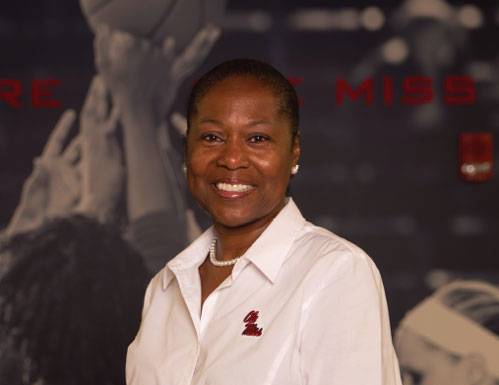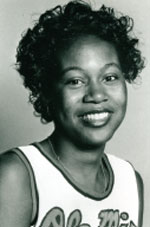Contributors
COLUMN: Gillom-Granderson Enjoys Mentoring Players along Life’s Journey
Peggie Gillom-Granderson was a four-year starter in women’s basketball at the University of Mississippi who later became a college basketball coach. Those are significant accomplishments, but there’s much more to her story.

By Dominic Jackson
IMC Student
Peggie Gillom-Granderson was a four-year starter in women’s basketball at the University of Mississippi who later became a college basketball coach. Those are significant accomplishments, but there’s much more to her story.

Gillom-Granderson was the first female African-American athlete at Ole Miss when she arrived in the fall of 1976 from Lafayette County High School not far from the Ole Miss campus. She was from Abbeville, just a few miles north of Oxford. She and her husband, Anthony Granderson, live there today.
I wanted to hear more of her story. I wanted to focus on how the experience of being the first African-American female athlete at the school impacted not only her time here, but her life after college. I wanted to learn how being a star player impacted her career path of becoming a coach in the future. It was an honor to interview her.
“When I first arrived on campus and joined the team, my teammates and coach at the time embraced me like no other,” Gillom-Granderson said.
She played under three head coaches during her time at Ole Miss. Pam Davidson was the head coach during her freshman year, while Lin Dunn was the head coach her sophomore season. As a junior and senior, Gillom-Granderson played for Van Chancellor. She would later join him as an assistant coach at Ole Miss and in the WNBA.
Gillom-Granderson remains Ole Miss’ all-time leading scorer in women’s basketball with 2,486 points and leading rebounder with 1,271. She is one of two players in Ole Miss history to ever score more than 2,000 points and have more than 1,000 rebounds. She compiled 51 double-doubles in 144 career games at Ole Miss.
But playing at a school as the first African-American player in her sport helped her to stay focused and also true to herself.
“It helped me mature, and quickly,” she said. “People looked up to me, not only because I was African American, but because I was also a good player.”
Indeed she was. Gillom-Granderson led the Ole Miss women’s basketball team to AIAW State Tournament Championships in 1978 and 1979 and a berth in the AIAW National Tournament in 1978. This was before the NCAA and the Southeastern Conference sanctioned women’s basketball. That happened in the early 1980s.
Following her last season as a player at Ole Miss, Gillom-Granderson was a finalist for the Wade Trophy, which goes to the nation’s top college women’s basketball player each season. It is named for a Mississippian, Margaret Wade, who was a successful coach at Delta State University.
In 16 seasons as an assistant coach to Chancellor, she helped lead Ole Miss to 14 NCAA tournament appearances, including five Sweet Sixteen and four Elite Eight appearances. In 1991-92, she helped lead Ole Miss to its first regular-season SEC title.
As an assistant coach for USA Basketball, she helped guide the 1999 U.S. Pan American Games team to a bronze medal, and the 2000 U.S. Olympic team to a gold medal.
She served as head coach of the Texas A&M women’s basketball team for five seasons (1999-2003).
Gillom-Granderson was inducted into the Ole Miss Athletics Hall of Fame in 1996, Mississippi Sports Hall of Fame in 1997, and Women’s Basketball Hall of Fame in 2013.
In 2008, the C SPIRE Gillom Trophy, which is named in her honor, is presented to Mississippi’s top collegiate women’s basketball player by the Mississippi Sports Hall of Fame and Museum.
The Gillom Sports Center on the Ole Miss campus is named for her and her sister, Jennifer, also a standout basketball player at Ole Miss.
Gillom-Granderson said her time playing basketball at Ole Miss helped her to get out of her own shell, while being around people from various religions and racial backgrounds. To also be the best player and to carry that responsibility helped shape who she is now. It showed an eagerness from her to learn from her own mistakes at a young age.
“For me, it was different,” she said, mentioning most of her time before college had been spent around family and her friends and local teachers. “It opened my eyes to new people and different ways of life. It taught me a lot of principles I still carry to this day.”
I loved her response that she looked past the fact that some might not have accepted her at that time. She looked at the best qualities of each person and incorporated it into her own life. Now she carries that on as a mentor to student-athletes today. She worked for several years with the Fellowship of Christian Athletes chapter at Ole Miss.
“Oh, I love it,” she said. “Helping these girls keep faith in God and believing in themselves is something I’ve always wanted to do.”
Gillom-Granderson also explained that something she wished she had during her early days in college was someone who could help keep her path a little more steady. That’s what she hopes she is for players today, she explained, someone for them to talk to about anything they want or need.
As an African-American student at the University of Mississippi, I enjoyed writing Peggie Gillom-Granderson’s story and could relate to many parts from start to finish. She has a passion for helping people, not only stay on the right path but also find their way through Christ.
“I want them to be comfortable and be able to talk to me,” she said. “It was multiple nights after losing a game or not performing well that I wished that I had someone in the shoes that I’m in today.”





























